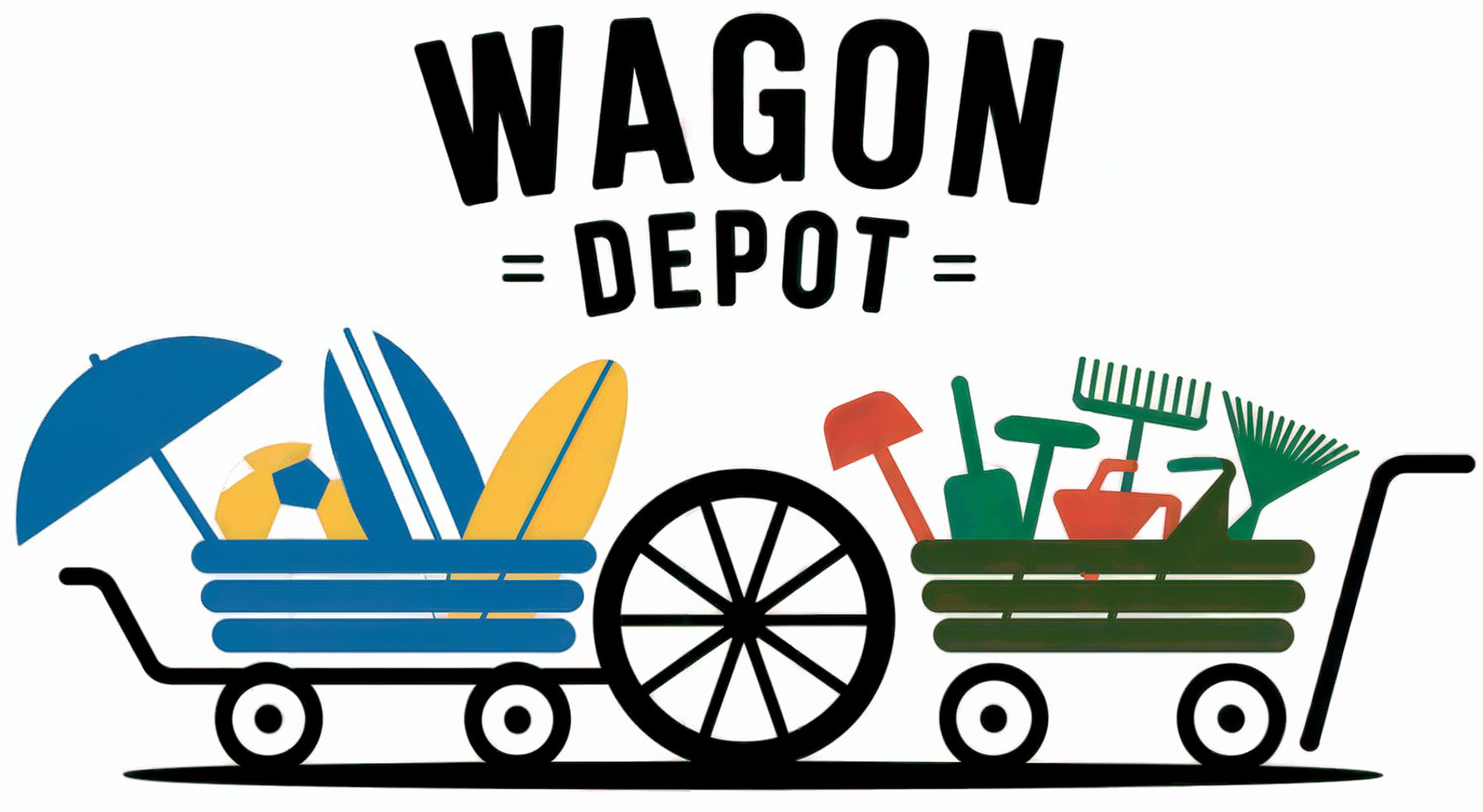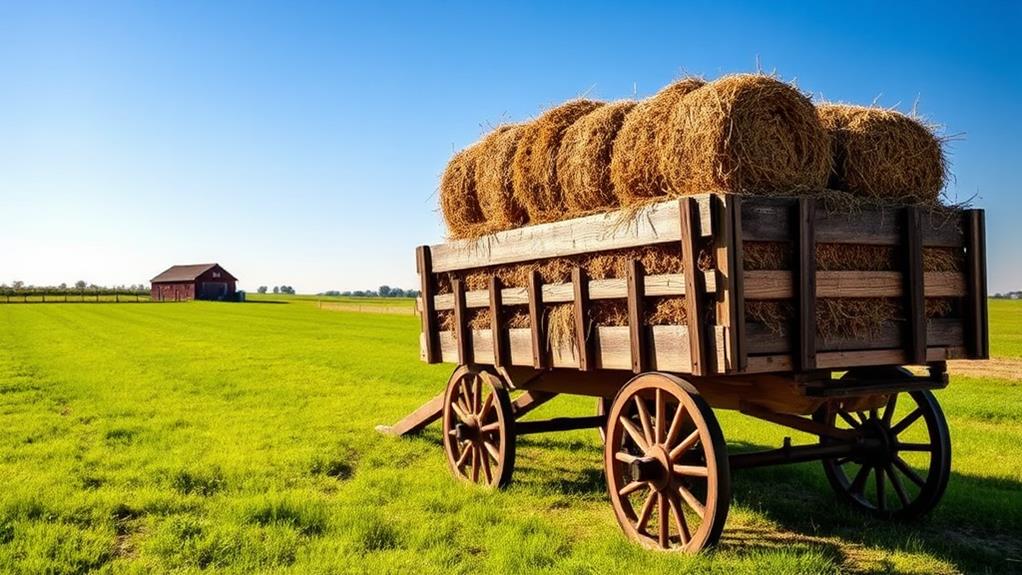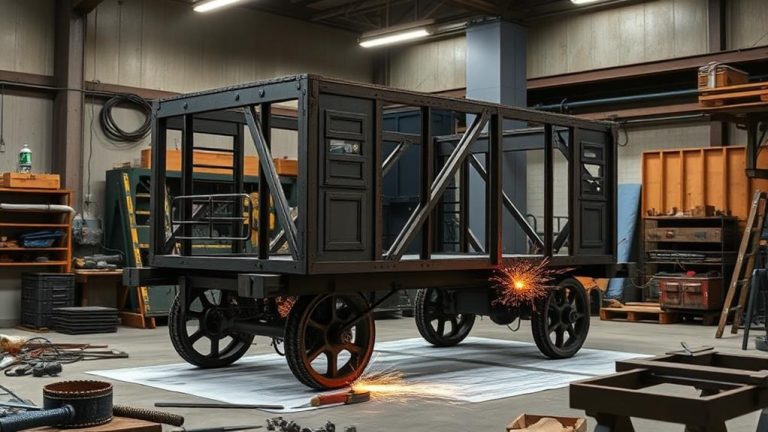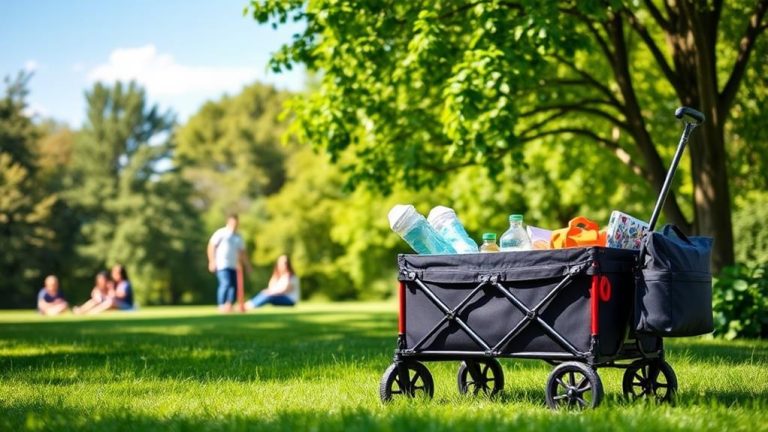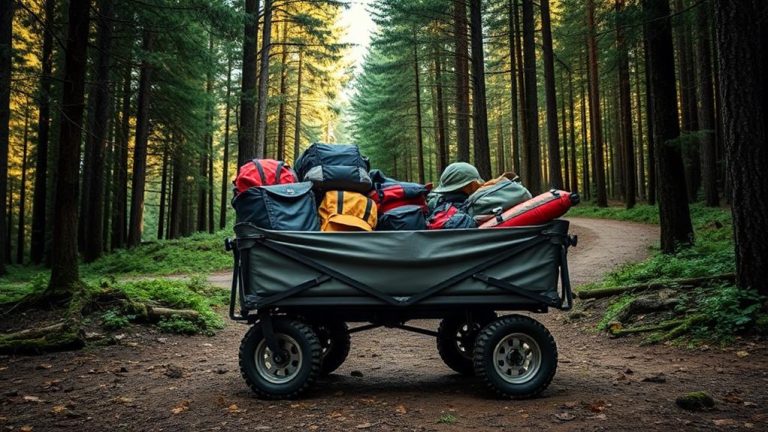When you’re seeking top-rated farm wagons for maximum load capacity, you’ll want models that boast heavy-duty construction and high-quality materials. Look for wagons that support loads exceeding 4,500 pounds, with features like robust steel frames and all-terrain tires for stability. Models from reputable brands like WagonMaster and Tarter Farm and Ranch are worth considering, thanks to their durability and customer satisfaction. Pay attention to load distribution design and wheel types, which greatly affect performance. Maintenance is key for longevity, ensuring your wagon remains reliable for years. Discover even more crucial insights to optimize your selection. Additionally, opting for heavyduty farm wagons with reinforced axles and corrosion-resistant coatings can further enhance durability and performance. Consider models with removable side panels for added versatility, making it easier to transport various types of loads efficiently. Investing in a well-built wagon will save you time and effort while ensuring long-term reliability on your farm. For those handling particularly demanding tasks, selecting top high-capacity farm wagons with advanced suspension systems can provide smoother transport across uneven terrain. Additionally, features like ergonomic pull handles and strategically placed tie-down points can improve usability and safety. Prioritizing these elements will help ensure that your wagon meets both your efficiency and durability needs in the long run.
Features of Heavy Duty Wagons
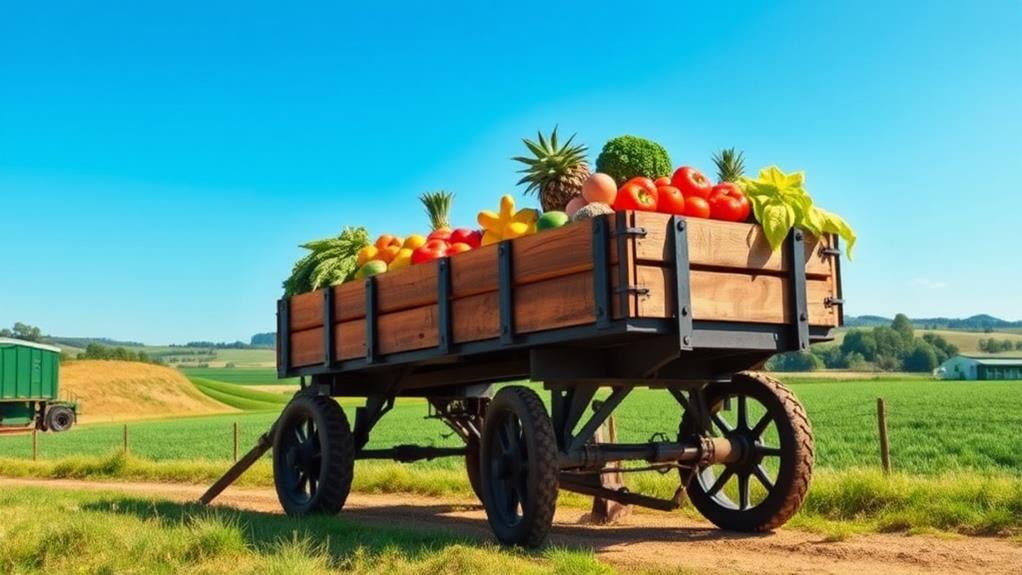
When considering the features of heavy duty wagons, what should you prioritize for ideal performance? First and foremost, focus on heavy duty materials. The construction of your wagon should be robust, using steel frames and reinforced components to withstand the stresses of transporting heavy loads. This guarantees durability and longevity, allowing you to tackle any task without the worry of wear and tear.
Next, pay attention to the wheels. Opt for larger, all-terrain tires that provide stability and ease of movement over uneven surfaces. This will improve maneuverability, making it easier for you to navigate through fields or rocky paths.
Don't overlook ergonomic handles. A well-designed handle not merely improves comfort but also allows for better control during pulling or pushing the wagon. Look for adjustable or cushioned handles that reduce strain, making your hauling experience more enjoyable.
Lastly, consider the capacity. Choose a wagon that can accommodate your specific needs, whether it's for hauling equipment, feed, or tools. By prioritizing these features—heavy duty materials, ergonomic handles, and sufficient capacity—you'll guarantee your wagon delivers superior performance for all your farming adventures.
Top Farm Wagon Brands
When considering top farm wagon brands, it's crucial to evaluate their innovative design features that improve load capacity and usability. You'll want to look at how durability and performance set these brands apart in the field. Comprehending these aspects will help you make an informed decision for your farming needs.
Leading Brands Overview
Durability and functionality are paramount in the sector of farm wagons, where the right choice can greatly impact your operational efficiency. You want to select a brand with solid reputation and responsive customer service, as these factors can make a significant difference in your experience.
Here are some leading brands in the farm wagon market:
- WagonMaster: Known for their heavy-duty construction and excellent load capacity, they stand out in both durability and design.
- Tarter Farm and Ranch: With a long history in agricultural equipment, Tarter offers a range of farm wagons suitable for various tasks, backed by strong customer support.
- Ames: Their innovative wagons are designed for ease of use, guaranteeing you can maneuver them effortlessly, even under heavy loads.
- CountyLine: This brand is recognized for its affordability without sacrificing quality, making it a popular choice among farmers.
When you're looking for a farm wagon, consider these brands. They not only deliver on performance but additionally guarantee you have the support needed to keep your operations running smoothly.
Innovative Design Features
Top farm wagon brands are not merely recognized for their reliability but similarly for their innovative design features that boost functionality and user experience. These improvements, such as ergonomic handles and foldable designs, make using a farm wagon easier and more efficient. You'll appreciate how these features allow for better maneuverability and storage solutions.
Here's a quick look at some standout features from top brands:
| Brand | Innovative Feature | Benefits |
|---|---|---|
| Brand A | Ergonomic Handles | Reduces strain during transport |
| Brand B | Foldable Design | Saves space when not in use |
| Brand C | Quick-Release Mechanism | Facilitates fast loading/unloading |
| Brand D | All-Terrain Wheels | Improves stability on rough terrain |
With ergonomic handles, you can comfortably grip and steer your wagon, reducing fatigue during long hauls. The foldable design not only makes storage convenient but likewise allows for easy transport between locations. By integrating these innovative features, top farm wagon brands guarantee that you have a product that meets your needs as you provide the freedom to tackle any task on your farm efficiently.
Durability and Performance
A reliable farm wagon should withstand the rigors of everyday use during maintaining ideal performance under various conditions. When selecting a top farm wagon, you'll want to take into account factors that contribute to its durability and performance, particularly how it handles load distribution and weight management.
Here are some key features to look for:
- Heavy-Duty Materials: Look for wagons made from high-strength steel or reinforced composites that resist wear and tear.
- Robust Wheel Systems: Choose wagons with strong, durable wheels designed for various terrains, guaranteeing smooth operation and reduced friction.
- Load Capacity Ratings: Check the manufacturer's specifications for maximum load capacity to avoid overloading and guarantee safety.
- Adjustable Axles: Opt for wagons featuring adjustable axles, which can improve load distribution and stability under heavy weights.
Best Farm Wagons for Durability
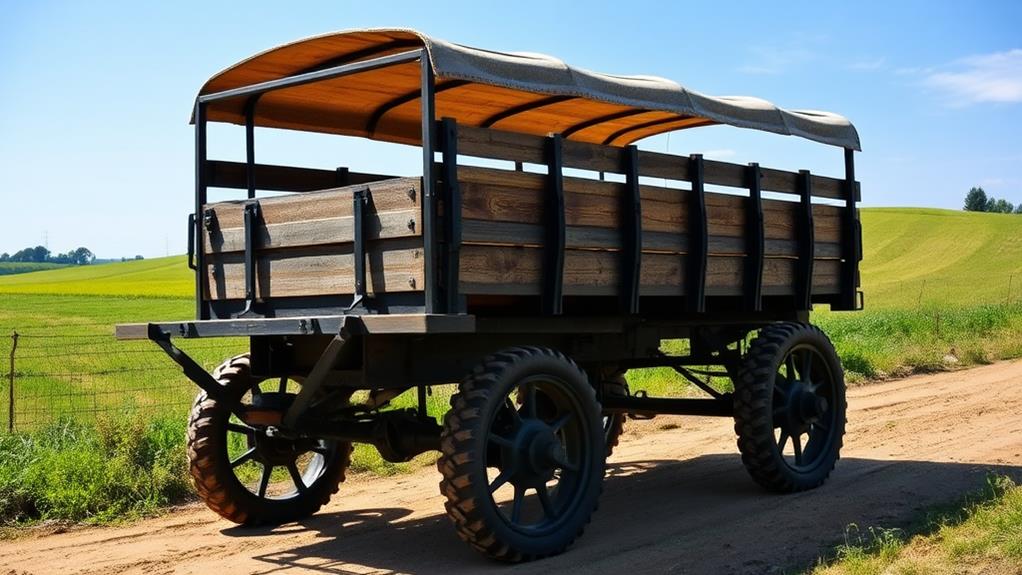
In the matter of selecting farm wagons that can withstand the rigors of daily use, durability is key. You'll find that the best farm wagons for longevity are constructed from high-quality materials like heavy-duty steel or reinforced plastic, which resist wear and tear over time. Different farm wagon types, such as utility wagons or garden carts, offer varying levels of strength and versatility, so it's crucial to choose one that aligns with your specific needs.
When evaluating these wagons, consider how load distribution affects their lifespan. A well-designed wagon guarantees even weight distribution, minimizing stress on any one part of the structure. Look for features like strong axle configurations and sturdy wheel systems that can handle heavy loads without compromising stability.
Moreover, inspect the finishes and coatings on the wagon. Corrosion-resistant treatments and UV protection will extend the life of your investment, especially if you're frequently using it outdoors. By focusing on these aspects, you'll not only improve your farm's operational efficiency but additionally enjoy the freedom that comes with knowing your equipment can handle whatever you throw at it.
Load Capacity Ratings
Comprehending load capacity ratings is crucial when selecting a farm wagon, as these specifications determine how much weight the wagon can safely transport. Grasping the load capacity factors will help you make informed decisions, guaranteeing safety and efficiency in your operations. Key considerations include:
- Materials Used: The strength of the materials directly impacts the load capacity.
- Wagon Design: The design influences how weight is distributed across the axle.
- Load Distribution: Proper load distribution prevents undue stress on the wagon and improves stability.
- Wheel Size and Type: These factors affect the overall weight-bearing capability.
When evaluating a farm wagon, always check the manufacturer's load capacity ratings. Exceeding these ratings can lead to accidents or equipment failure, costing you time and money. Make sure to reflect on how you'll load items onto the wagon; uneven loads can compromise both safety and performance. Balancing the load not just protects your wagon but guarantees peak maneuverability. By keeping these factors in mind, you'll choose a farm wagon that meets your demands as well as providing the freedom to transport your goods efficiently.
Wheel Types for Stability
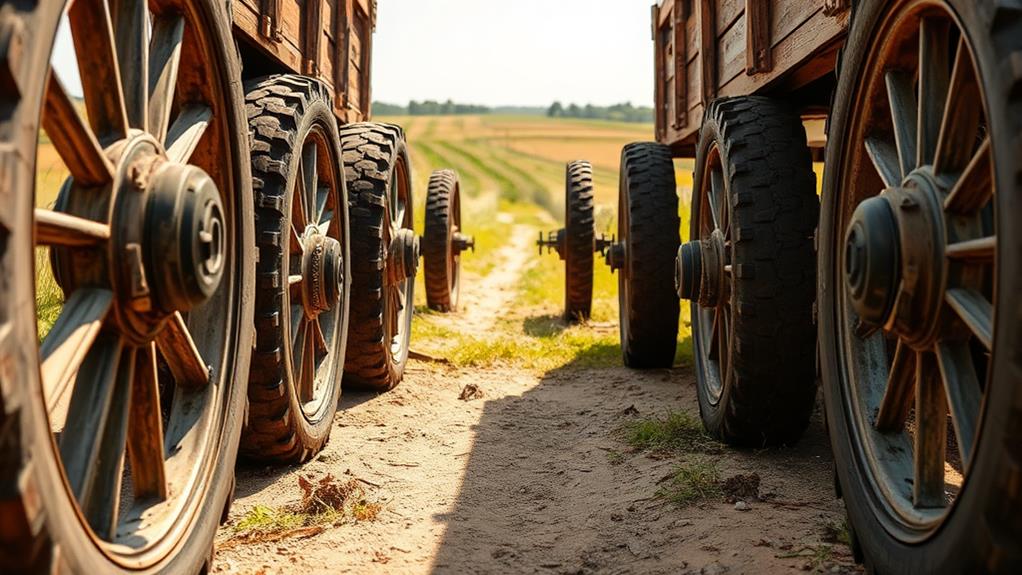
When choosing wheel types for your farm wagon, consider the differences between pneumatic and solid wheels for ideal stability. Pneumatic wheels offer better shock absorption on uneven terrain, whereas solid wheels provide durability and lower maintenance. Furthermore, the size of the wheels plays an essential role in load distribution and maneuverability, impacting your wagon's overall performance.
Pneumatic vs. Solid Wheels
Choosing the right wheels for your farm wagon can greatly impact its stability and load-carrying capacity. You'll often find yourself weighing the benefits of pneumatic versus solid wheels. Each type has its distinct characteristics that cater to different needs.
Pneumatic Advantages:
- Shock Absorption: Pneumatic wheels provide better cushioning on uneven terrain, enhancing ride comfort.
- Traction: They offer superior grip, especially in wet or muddy conditions, preventing slippage.
- Versatility: Ideal for various terrains, making them adaptable to multiple farming environments.
- Lower Ground Pressure: Pneumatic wheels minimize soil compaction, preserving your land's health.
On the flip side, solid wheels are known for their solid durability. They're less prone to punctures or damage, making them a reliable choice for heavy loads and rough conditions. Nevertheless, they may lack the shock absorption that pneumatic wheels offer.
Ultimately, your decision should align with your specific farming needs, load types, and the terrains you navigate. Balancing these factors will lead you to the best wheel option for your farm wagon, ensuring efficient operations and maximizing productivity.
Wheel Size Considerations
Selecting the right wheel size is vital for optimizing your farm wagon's stability and load capacity. Larger wheels typically offer better ground clearance and can navigate uneven terrain more effectively, which is imperative when you're hauling heavy loads. Nonetheless, it's important to balance size with the weight and strength of the axle. A robust axle is required to support larger wheels, ensuring that it can handle the increased stress during operation.
When considering wheel material, think about the trade-offs. Steel wheels are durable and can support heavy loads, but they may not provide the best traction on soft ground. Conversely, rubber wheels offer better grip and shock absorption but can limit load capacity if they're too small.
Ultimately, the size and material of your wagon wheels directly impact stability and performance. If you're frequently transporting substantial loads across varied terrains, opting for larger, high-quality wheels made from suitable materials can make a significant difference. Pairing the right wheel size with adequate axle strength will maximize your farm wagon's efficiency and longevity, giving you the freedom to tackle any task on your land.
Material Quality and Construction
The quality of materials and construction methods greatly impacts the load capacity and durability of farm wagons. When you're looking for a wagon that can handle heavy loads, comprehending the different material types and construction techniques is vital. Here's what you should consider:
- Steel vs. Aluminum: Steel offers strength and resistance to deformation, whereas aluminum is lighter and more corrosion-resistant.
- Wood vs. Composite Materials: Traditional wooden wagons provide aesthetic appeal and durability, but composite materials are often lighter and require less maintenance.
- Welding Techniques: Look for wagons with advanced welding techniques; they improve structural integrity and reduce the risk of failure under load.
- Reinforcement Features: Check for reinforced corners and cross-bracing, which markedly improve the overall strength and stability of the wagon.
Customer Reviews and Ratings
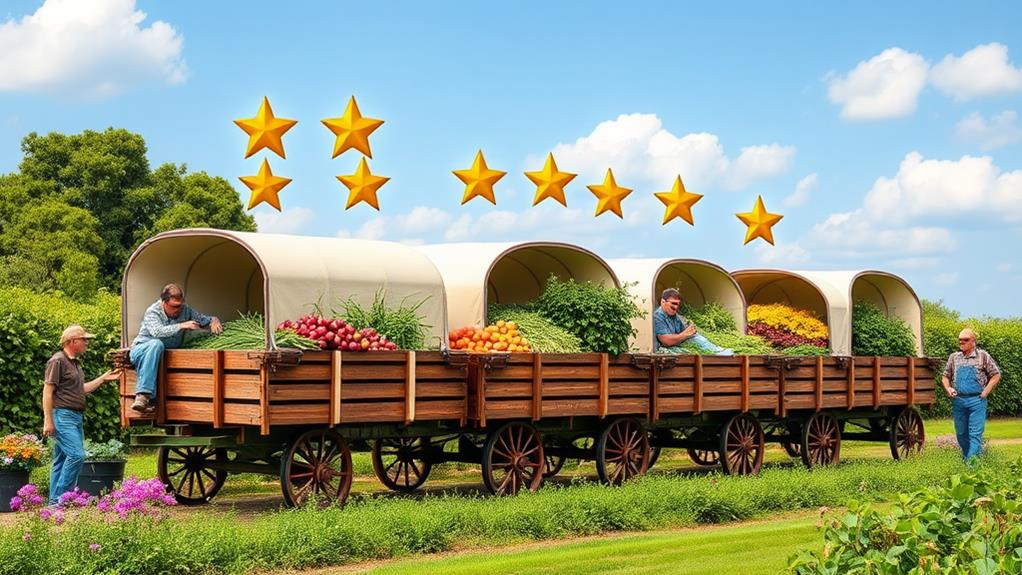
Comprehending customer reviews and ratings is fundamental when evaluating farm wagons, especially after considering material quality and construction. These reviews provide real-world insights into product reliability and customer satisfaction that specifications alone can't convey. When you read through ratings, pay attention to common themes—like ease of use, durability under load, and performance over time.
Look for feedback on how the wagon handles rough terrain, as this can directly affect your operational efficiency. High ratings often correlate with a wagon's ability to maintain structural integrity in spite of frequent heavy use. Customers tend to highlight features such as wheel design, hitch compatibility, and the overall user-friendliness of the wagon.
Additionally, consider how quickly the manufacturer responds to queries or issues. A responsive customer service team often indicates a commitment to customer satisfaction and product reliability.
Maintenance Tips for Longevity
To guarantee your farm wagon remains in prime condition for years to come, regular maintenance is crucial. Implementing a preventive maintenance schedule not only improves performance but additionally extends the life of your wagon. Here are some practical tips to take into account:
- Inspect tires regularly: Check for wear and proper inflation to confirm ideal traction and load distribution.
- Perform seasonal checks: Before and after each season, examine the frame, axles, and wheels for signs of rust or damage.
- Lubricate moving parts: Apply appropriate grease to bearings and pivot points to minimize friction and prevent wear.
- Clean after use: Remove debris and wash off dirt to prevent corrosion and maintain a clean working environment.
Comparing Price vs. Performance
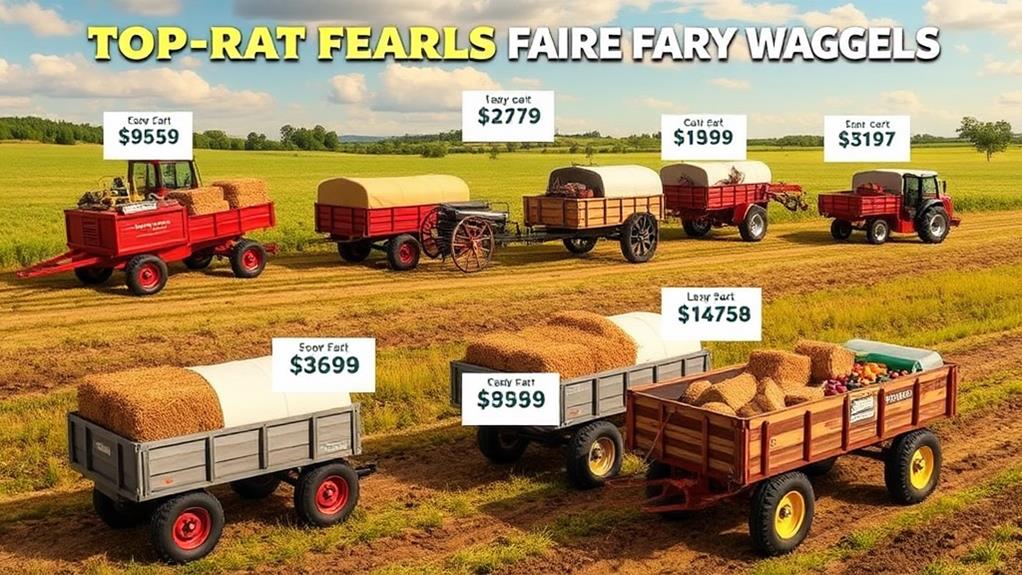
When weighing price against performance for farm wagons, you'll want to dig deep into the specifications and features that matter most for your operation. Cost efficiency and performance metrics are essential to guaranteeing you get the best value for your investment.
Here's a quick comparison to help you visualize your options:
| Wagon Model | Price (USD) | Load Capacity (lbs) |
|---|---|---|
| Model A | $1,500 | 3,000 |
| Model B | $2,200 | 4,500 |
| Model C | $1,800 | 4,000 |
Balancing these factors can determine whether a higher upfront cost translates to greater long-term savings and productivity. For instance, although Model B may seem pricier, its superior load capacity could improve your operational efficiency, potentially offsetting the initial investment.
Consider your workload and how often you'll utilize the wagon. If you're hauling heavy loads frequently, the extra cost for a high-performance model could pay off in the long run. In the end, aligning your specific needs with the right wagon guarantees you maximize both cost efficiency and performance.
Frequently Asked Questions
What Is the Average Lifespan of a Heavy-Duty Farm Wagon?
The average lifespan of a heavy-duty farm wagon is typically around 10 to 20 years, depending on usage and care. To maximize longevity, you should focus on maintenance tips like regular inspections and lubrication. Choosing wagons made from materials with high durability, such as steel or reinforced plastic, can additionally improve lifespan. Proper storage when not in use and timely repairs will guarantee your wagon remains reliable for years to come, giving you more freedom on the farm.
Are There Any Specific Safety Features for Farm Wagons?
Envision you're hauling heavy supplies across uneven terrain. You'd want a farm wagon equipped with safety features like load stability systems to prevent tipping. Many modern farm wagons comply with safety regulations that require reinforced frames and braking systems, which help maintain control during transport. These features don't just improve safety; they furthermore give you peace of mind, allowing you to focus on your work without worrying about potential accidents.
Can Farm Wagons Be Customized for Specific Tasks?
Absolutely, farm wagons can be personalized for specific tasks to improve task efficiency. You can add custom features like adjustable sides, specialized hitch systems, or reinforced flooring designed for different loads. If you're hauling crops, a high-sided design might be ideal, whereas livestock transport could benefit from ventilation and dividers. With the right modifications, your farm wagon can adapt to various needs, giving you the freedom to tackle multiple tasks effectively.
How Do I Choose the Right Size Wagon for My Needs?
When choosing the right size wagon, consider your specific load capacity needs. Evaluate the materials you'll transport and their weight. A wagon with a sturdy wheel design will improve maneuverability and stability, especially on uneven terrain. Make sure to factor in the dimensions of the loads, in addition to the space available for storage. Taking these elements into account will help you select a wagon that fits your operational requirements perfectly.
Are Electric or Motorized Options Available for Farm Wagons?
You might be wondering if you can boost your farming game with electric farm wagons or motorized farm wagons. Well, you can! These options offer improved efficiency, reducing the physical strain of manual hauling. Electric wagons provide quiet operation and low maintenance, whereas motorized versions can handle heavier loads with ease. Envision the freedom of moving your materials effortlessly across the fields, allowing you to focus on what truly matters—your farming success.
